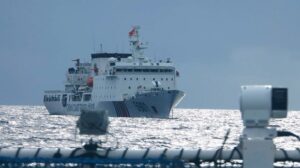China’s ‘Monster’ Ship Shadows Philippine Vessel at Disputed Shoal

China’s ‘Monster’ Ship Shadows Philippine Vessel at Disputed Shoal

China’s ‘Monster’ Ship Shadows Philippine Vessel at Disputed Shoal
Tensions in the South China Sea have escalated following an incident involving a massive Chinese vessel shadowing a Philippine ship near the disputed Scarborough Shoal. This latest confrontation highlights the ongoing territorial disputes between China and the Philippines, raising concerns over maritime security and sovereignty in the region.
On [Date], a Chinese Coast Guard vessel, described by officials as a “monster” ship due to its enormous size and intimidating presence, closely followed a Philippine fishing boat in the waters near Scarborough Shoal. The Philippine vessel, the BRP Sierra Madre, was on a routine patrol when the Chinese ship began trailing it, coming dangerously close at times, according to the Philippine Coast Guard.
Philippine President Ferdinand Marcos Jr. expressed his concern over the incident, stating, “The actions of the Chinese Coast Guard are provocative and dangerous. We call for restraint and adherence to international law to avoid further escalation in the region.”
Vice Admiral George V. Ursabia Jr., the Commandant of the Philippine Coast Guard, provided details on the encounter. “Our vessel, the BRP Sierra Madre, was conducting legitimate maritime patrols in our territorial waters. The aggressive maneuvering of the Chinese vessel poses a serious threat to the safety of our crew and the stability of the region,” Ursabia said.
The Chinese government, through its Foreign Ministry spokesperson Wang Wenbin, defended the actions of its Coast Guard. “The Chinese Coast Guard was performing its duties to safeguard China’s sovereignty and maritime rights. The Scarborough Shoal is Chinese territory, and we will continue to protect our interests in the South China Sea,” Wang stated.
The incident has drawn international attention, with several countries expressing their concerns over the rising tensions in the South China Sea. The United States, a key ally of the Philippines, reiterated its support for Manila and called for peaceful resolution of disputes.
U.S. State Department spokesperson Ned Price said, “We stand with our Philippine allies and urge China to respect international maritime law, including the 2016 arbitral tribunal ruling which invalidates China’s expansive claims in the South China Sea.”
The Scarborough Shoal, known as Huangyan Island in China, has been a flashpoint in the South China Sea dispute. Both China and the Philippines claim sovereignty over the shoal, which is a rich fishing ground and holds strategic importance. In 2012, China took control of the shoal following a standoff with the Philippines, further complicating the territorial dispute.
In 2016, the Permanent Court of Arbitration in The Hague ruled in favor of the Philippines, rejecting China’s claims to historical rights over most of the South China Sea. Despite the ruling, China has continued to assert its claims and increase its presence in the region, leading to frequent confrontations with other claimant countries.
The latest incident underscores the volatile nature of the South China Sea disputes and the potential for conflict. Analysts warn that such encounters could lead to unintended escalations and undermine regional stability.
Dr. Jay Batongbacal, Director of the University of the Philippines Institute for Maritime Affairs and Law of the Sea, commented on the situation. “The presence of these large Chinese vessels in contested waters is a show of force meant to intimidate and assert dominance. It’s crucial for the international community to respond diplomatically to prevent further escalation,” Batongbacal said.
In light of the incident, there have been renewed calls for dialogue and diplomacy to resolve the disputes. The Association of Southeast Asian Nations (ASEAN) has urged all parties to exercise restraint and engage in constructive negotiations.
ASEAN Secretary-General Dato Lim Jock Hoi stated, “ASEAN remains committed to ensuring peace and stability in the South China Sea. We call on all parties to adhere to international law, including the United Nations Convention on the Law of the Sea (UNCLOS), and to resolve disputes through peaceful means.”
The shadowing of a Philippine vessel by a Chinese “monster” ship at the Scarborough Shoal highlights the ongoing tensions and the complex nature of the South China Sea disputes. As the situation develops, the importance of international cooperation and adherence to maritime law remains paramount to prevent further conflicts and ensure regional stability.
Do you find Tmaq Media useful? Click here to give us five stars rating!

























